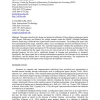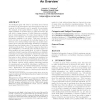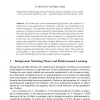1225 search results - page 175 / 245 » Design Principles for Intelligent Environments |
123
click to vote
IAT
2009
IEEE
15 years 9 months ago
2009
IEEE
—“Autonomic systems” merge advancements in the field of multi-agent software design, dynamic analysis, and decentralized control in order to assist designers in constructing...
126
click to vote
AOSE
2007
Springer
15 years 6 months ago
2007
Springer
Abstract. Nowadays, information systems have to perform in complex, heterogeneous environments, considering a variety of system users with different needs and preferences. Software...
135
click to vote
AIEDU
2005
15 years 2 months ago
2005
This paper describes the design and empirical validation of three distinct pedagogical agent roles (Expert, Motivator, and Mentor) for college students within the MIMIC (Multiple I...
119
click to vote
PODS
2006
ACM
16 years 2 months ago
2006
ACM
An intelligent agent will often be uncertain about various properties of its environment, and when acting in that environment it will frequently need to quantify its uncertainty. ...
115
Voted
ECAL
2005
Springer
15 years 7 months ago
2005
Springer
An evolutionary reinforcement-learning algorithm, the operation of which was not associated with an optimality condition, was instantiated in an artificial organism. The algorithm ...



